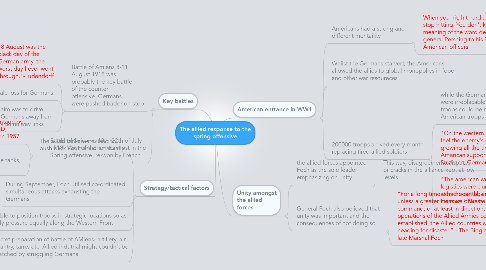
1. Strategy/tactical factors
1.1. The allied tanks were used to push back Germans dramatically
1.1.1. "Foch won tactical advantage by use of tanks"- Thomson D, European since Napoleon 1957
1.1.2. The tanks were blanketed by smokescreens, then out came the tanks, lowering German morale
1.2. During September, Foch utilised co-ordinated, simultaneous attacks exhausting the Germans
1.3. Foch able to position troops in strategic locations so as to apply pressure equally along the Western Front
1.4. Secret preparation of battle of AMiens- artillery, air, infantry, tanks etc. Allied indutrial might couldn't be matched by struggling Germans
2. Key battles
2.1. Battle of Amiens 8-11 August 1918 was probably the key battle of the counter offensive. Germans were pushed back non-stop
2.1.1. "8 August was the black day of the German army, the worst day I ever went through."-Ludendorff
2.1.2. Huge morale loss for Germans
2.1.3. aim was to drive Germans away from vital railway links
2.2. Battle of Soissons 18th-22th of July 1918. Most of the territory lost in the Spring offensive, re-won by French
3. American entrance in WW1
3.1. Americans had a strong and different mentaility
3.1.1. When you hit, hit hard and don't stop hitting. You don't know the meaning of the word defeat"- general Pershing to his 900 American officers
3.2. Whilst the Germans starved, the Americans allowed the allies to global monopolies in food and other war resoureces
3.3. 200000 troops arrived every month replacing tired allied soldiers
3.3.1. while the German storm troopers were irreplacable, French/British troops could be replaced by these American troops
3.3.2. "On the western front, we can feel the enemy's strength growing all the time because of American support"- Herbert Sulzbach, German soldier
3.3.2.1. The Germans felt the impact of Americans
3.3.3. "The american were inexperienced. Their logistics were clumsy...Still yet they had won the battle, and would win more"- Holmes R. Western front BBC 1999
4. Unity amongst the allied forces
4.1. the allied forces appointed Foch as the sole leader emphasizing on unity
4.1.1. This way, disagreements,disputes or cracks in the alliance kept at low levels
4.2. General Foch also believed that unity was important and the consequences of not doing so
4.2.1. “For a long time it had been obvious that unless a greater measure of unity in command, or at least in direction, of the operations of the Allied Armies could be established, the Allied countries were heading for disaster.” - The Biography of the late Marshal Foch
